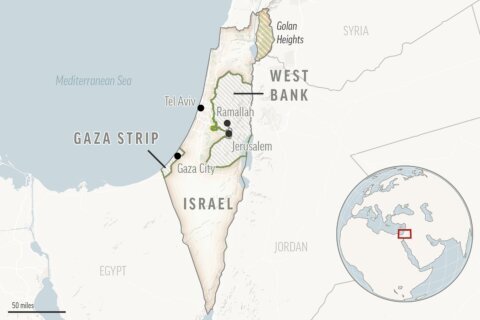UNITED NATIONS (AP) — The U.N. special envoy for Myanmar warned that the Southeast Asian nation is in crisis, with conflict escalating, criminal networks “out of control” and human suffering at unprecedented levels.
Julie Bishop told the U.N. General Assembly’s human rights committee on Tuesday in her first report since being appointed by Secretary-General Antonio Guterres last April that “Myanmar actors must move beyond the current zero-sum mentality.”
The army in Myanmar ousted the elected government of Aung San Suu Kyi in February 2021 and suppressed widespread nonviolent protests that sought a return to democratic rule, leading to increasing violence and a humanitarian crisis.
In the past year, three powerful ethnic armed militias have gained territory, keeping the government’s ruling military increasingly on the back foot in fighting that has forced hundreds of thousands of civilians to flee their homes. According to the U.N., 3 million people are displaced across Myanmar and some 18.6 million need humanitarian assistance.
Bishop called for an end to the violence, stressing that “There can be little progress on addressing the needs of the people while armed conflict continues across the country.”
The former Australian foreign minister said she has engaged with the government, including Senior Gen. Min Aung Hlaing in Myanmar’s capital, Naypyidaw, as well as opposition representatives, ethnic armed organizations, women’s groups, human rights defenders and numerous countries. She gave no details about the meetings.
She said she has engaged with the current, previous and incoming ASEAN chairs in Vientiane, Laos; Jakarta, Indonesia; and Kuala Lumpur, Malaysia. The U.N. envoy said she has also visited Myanmar’s neighbors China and Thailand and will soon visit India and Bangladesh, “continuing to urge neighboring countries to leverage their influence.” She said she will also return to Naypyidaw but gave no time frame. She gave no details about any of the meetings.
At the recent summit between the United Nations and the Association of Southeast Asian Nations, known as ASEAN, Bishop said Secretary-General Guterres backed strengthened cooperation between the U.N. envoy and the ASEAN chair “on innovative ways to promote a Myanmar-led process.”
This includes “effective implementation” of a five-point ASEAN plan Myanmar’s rulers agreed to in April 2021 but have done little to fulfill. It calls for the immediate cessation of violence, a dialogue among all concerned parties mediated by an ASEAN special envoy, provision of humanitarian aid and a visit to Myanmar by the association’s special envoy to meet all concerned parties.
“Any pathway to reconciliation requires an end to violence, accountability and unfettered access for the U.N. and its partners to address vulnerabilities among the marginalized, including Rohingya, ethnic communities and particularly women and youth,” Bishop said.
But instead she pointed to rising civilian casualties and the rule of law “so severely undermined that transnational crime emanating from Myanmar is proliferating.”
“The sheer scale of arms productions and trade, human trafficking, drug manufacture and trafficking, and scam centers means Myanmar now ranks highest among all member states for organized crime,” she said. “The criminal networks are out of control.”
Bishop backed Guterres who stressed the urgency of forging a path toward a democratic transition and return to civilian rule.
“I share his concern regarding the military’s stated intention to hold elections amid intensifying conflict and human rights violations,” she said.
Bishop warned that “the Myanmar conflict risks becoming a forgotten crisis.”
“The regional implications of this crisis are evident, but the global impact can no longer be ignored,” she said.
Copyright © 2025 The Associated Press. All rights reserved. This material may not be published, broadcast, written or redistributed.







